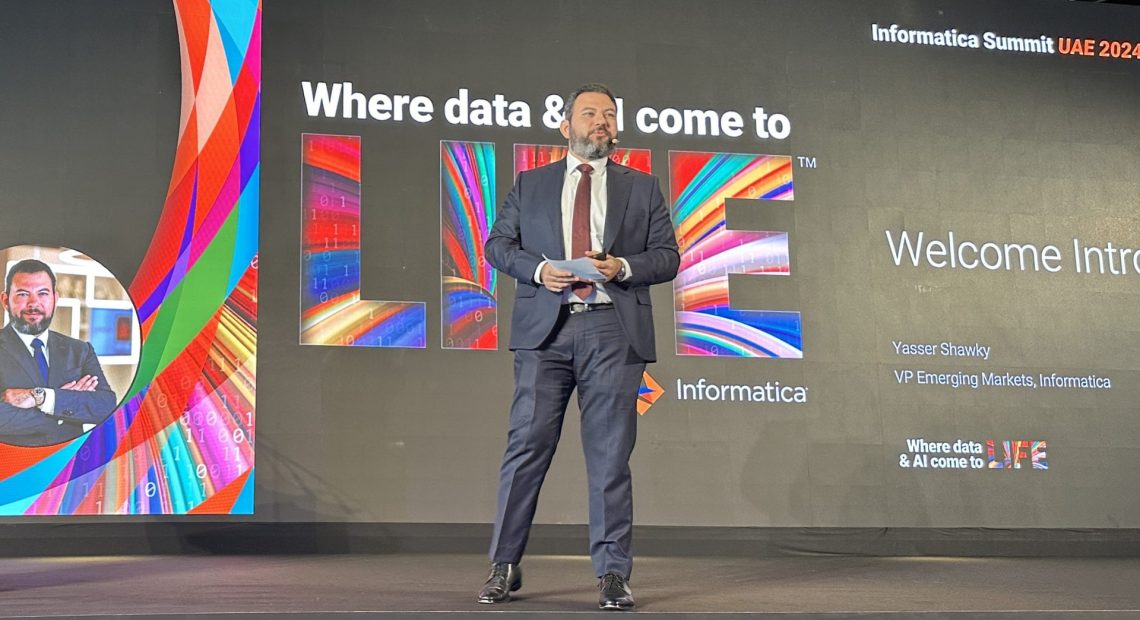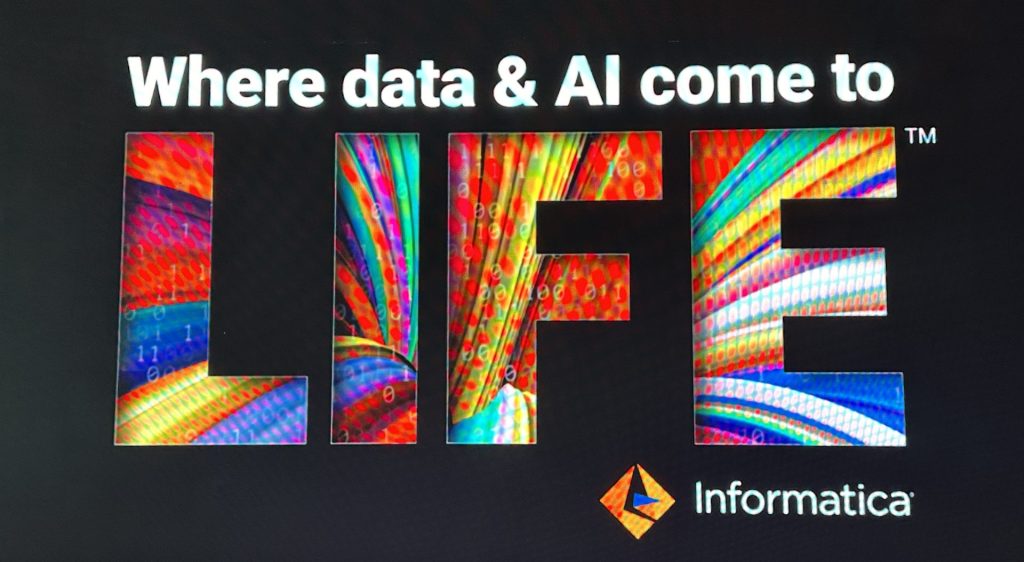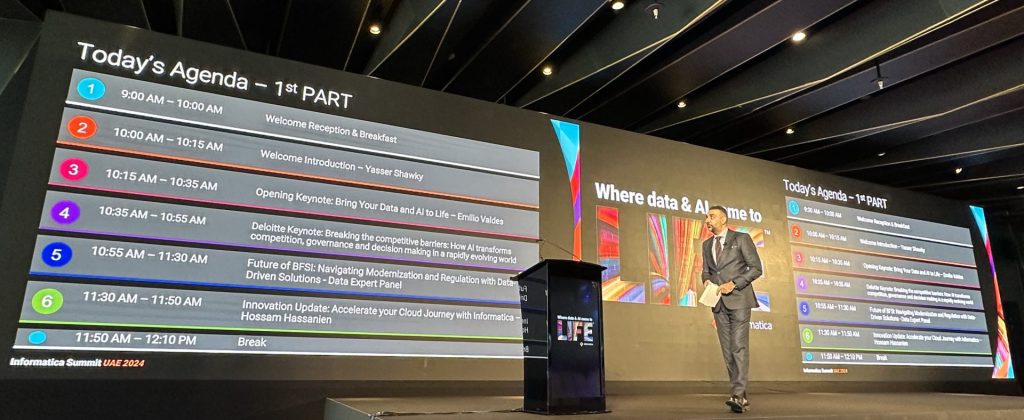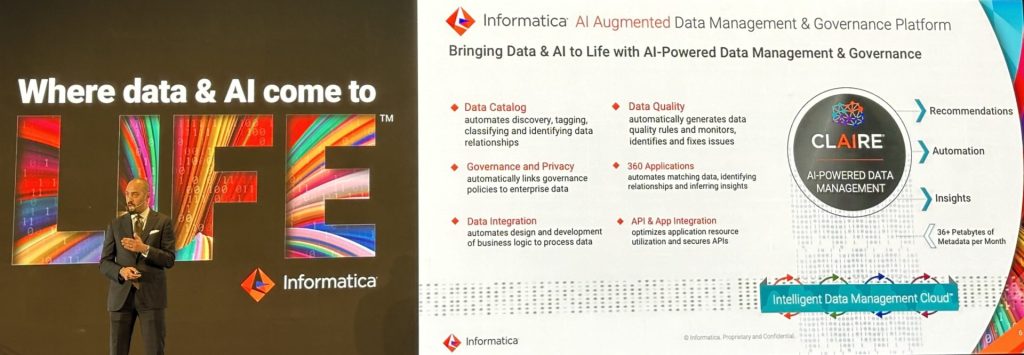Informatica brings data and AI integration to life in GCC region

With partnered innovative solutions
With a focus on innovation, Informatica, the US-based leader in enterprise AI-powered cloud data management, has been helping enterprises manage, integrate, and govern their data across hybrid cloud environments since 1993.
Informatica’s comprehensive suite of tools essentially enhances data quality, security, and collaboration, enabling companies to unlock the full potential of their data assets. Its flagship product, the Intelligent Data Management Cloud (IDMC), supports organisations in transforming raw data into actionable insights, driving digital transformation.
The Informatica Summit UAE 2024 was held in Dubai, UAE, on November 5, where Informatica unveiled new enterprise-grade GenAI solutions in association with leading technology platforms, including AWS, Google Cloud, Microsoft Azure, Oracle Cloud, Databricks, and Snowflake.
Yasser Shawky, Informatica’s Vice President for the Middle East, Africa, and Eastern Europe, engaged in an exclusive interview with Middle East News 247 on the sidelines of the day-long event.
Excerpts from the interview:
The Informatica Summit UAE 2024 theme is ‘Where Data and AI Come to Life.’ Can you elaborate on what this means in today’s digital landscape?
The core idea here is that AI, in its current form, is just a tool—it does not inherently generate value. It is like a car without fuel: it cannot take you anywhere without the correct input. For AI to truly deliver value, it needs clean, trusted, and high-quality data. The value comes from how effectively data is integrated with AI systems.
So, when we say “bring data to life,” we mean that organisations, with the active involvement of data professionals and decision-makers, must engage their data, ensure it is trustworthy, and make it ready for AI to process.
Data is the fuel that powers AI. Without it being in the right shape—free from inconsistencies or inaccuracies—AI’s outputs will be unreliable, and the insights it generates will be flawed.
At Informatica, our role is to help organisations unlock the potential of their data, especially in combination with AI, so they can make smarter decisions and gain actual business value.
Can you provide an overview of the current state of the data management industry in the GCC region?
The GCC region is undergoing a significant evolution in the data industry, a development of great interest to governments. In countries like Saudi Arabia and the UAE, governments strongly emphasise data management, recognising its pivotal role in governance, decision-making, and realising their economic and technological objectives.
Take Saudi Arabia, for example. The Saudi government is actively pushing for data democratisation across various entities. There is a strong emphasis on ensuring data is shared securely between departments and institutions, all while maintaining trust and data integrity. They [Saudis] have set comprehensive data guidelines, a critical step for any country or organisation wanting to leverage AI at scale.
The importance of data is not lost on big tech giants either. Microsoft, Amazon, and Google have all invested heavily in the region. They would not have made those investments if they had not seen government support and the potential to develop regional AI infrastructures.
Regional governments now view AI as a tool for optimisation and a driver of competitive advantage.
AI can potentially reduce costs, enhance decision-making, and position GCC countries favourably on the global stage. This optimism is reflected in the substantial investments in AI infrastructure, such as the $30 billion commitment between the UAE government, Microsoft, and Nvidia, which sets the stage for the region’s future leadership in AI.
From your GCC customers’ perspective, what are their biggest challenges? How is Informatica helping to bridge the gap?
Organisations in the GCC region face a few key challenges. The first and foremost issue is data quality. As anyone in the industry knows, data is inherently dynamic—people move, companies change, and information becomes outdated. This means that even the most comprehensive datasets will degrade over time. If businesses do not actively manage their data, it becomes unreliable, leading to bad decisions.
Another key challenge is the complexity of legacy systems. Many organisations in the region have been using in-house systems developed over decades. These systems were often built without a clear understanding of the data they contained. As a result, businesses do not know what data they have, let alone how to use it properly.
Informatica is at the forefront of addressing these challenges by offering robust data cataloguing and data quality solutions. Our tools empower businesses to gain a comprehensive understanding of their data, its location, and its trustworthiness. This knowledge enables organisations to initiate the process of cleaning, governing, and integrating their data, making it AI-ready.
For instance, our data cataloguing solutions have allowed companies in the GCC region to discover and classify their data automatically, making it easier to identify gaps or issues. Once the data is understood, it can be cleansed and transformed into something usable for AI, which is a crucial step for anyone looking to build AI systems on top of their existing data infrastructure. Businesses in the region use our solutions to improve their data quality, leading to more reliable AI outputs and better decision-making.

How do you see the data market evolving in the GCC region over the next few years?
The data market in the region is evolving rapidly, especially since the pandemic. Covid-19 was a wake-up call for many businesses—it highlighted the need for organisations to rely on data without physical presence.
During lockdowns, many businesses realised that traditional working methods were no longer sustainable, and data management became critical. The remote work model forced companies to examine their data governance and quality more closely.
One of the significant trends we are seeing is the adoption of cloud technologies. Most businesses still manage a mix of on-premise and cloud data, but the future is clearly in multi-cloud environments.
The challenge is managing this hybrid setup, ensuring data flows seamlessly across systems. Cloud environments, especially for AI, are essential because of their processing power and scalability. However, businesses cannot simply move everything to the cloud at once—they need to manage the transition carefully to ensure that data remains clean and accessible.
This hybrid and multi-cloud environment will be a crucial challenge for regional businesses, and data management solutions will be essential to handle this complexity. At Informatica, we are already helping businesses manage this transition. We are well-equipped to support companies navigating their journey to the cloud, ensuring they maintain data integrity and security.
What is Informatica’s unique value proposition in this competitive market, especially in light of the hybrid and multi-cloud environments?
Informatica’s value proposition is centred on our deep expertise in data management. We have been in this space for over 30 years and have developed comprehensive solutions for managing data across every stage of its lifecycle—from discovery and integration to governance, quality, and security.
Our solutions are agnostic, which means they can work across different systems, technologies, and clouds, which is a massive advantage in a multi-cloud world.
What makes us unique is the flexibility we offer. Our platform is designed to work seamlessly with both on-premise systems and cloud-based environments. Whether an organisation wants to migrate from on-premise to the cloud or operates in a hybrid or multi-cloud setup, we have the tools to manage that transition smoothly. Our architecture is built explicitly for flexibility, allowing customers to process their data wherever it resides—whether in one cloud or across multiple clouds.
Additionally, we have integrated AI into our platform to help automate many data management tasks that traditionally require human oversight. For example, our AI engine can automatically detect and fix data quality issues, assisting organisations to stay ahead of the curve without needing manual intervention. This is particularly important as AI-driven systems become more prevalent.

The GCC region is unique in many ways, especially in terms of its rapid development and the ambitions of its governments. Are there any specific challenges or opportunities that customers in this region face compared to other markets where Informatica operates?
The GCC region is unique because it is relatively new and fast-growing. Many of these countries are still in their infancy regarding technological development compared to Western markets, but they have big ambitions to catch up quickly.
Regional governments are investing heavily in cutting-edge technologies and want to be leaders in sectors like AI, fintech, and smart cities. There is a mentality of wanting to be first—whether leading in AI, space exploration, or hosting major international events.
This creates both challenges and opportunities. The challenge lies in the speed of innovation. Governments and enterprises are pushing to adopt new technologies rapidly and want to be ahead of the curve. This puts pressure on companies like Informatica to provide fast, flexible, and scalable solutions that can keep up with this pace.
The opportunity, of course, is enormous. Because these countries are starting from a modern infrastructure base, they can leapfrog older technologies and implement the latest solutions.
This makes it easier for us to introduce advanced data management solutions without the baggage of legacy systems. GCC governments are committed to driving technological growth and are very receptive to innovation. We can work closely with them to shape the region’s future of data management and AI.
What are Informatica’s growth plans for the next few years in the GCC region?
We are deeply committed to the GCC region and have made several critical investments to expand our footprint there. This year, we opened a new office in Saudi Arabia, serving as our regional headquarters. We are also launching Informatica Cloud in the UAE and Saudi Arabia, making it easier for local customers to adopt cloud-based data management solutions.
Our growth strategy in the region is twofold: expanding our direct presence and strengthening our partnerships. We are working closely with the region’s major system integrators and channel partners to extend our reach and offer our solutions to more customers. We also see a lot of growth in verticals like fintech, retail, and logistics, which are increasingly focused on using data to drive business value.
We expect the demand for data management solutions to grow exponentially in the next five to ten years, and we are well-positioned to be a key player in this transformation.
Informatica often refers to itself as the “Switzerland of data.” That’s a bold claim. Can you explain what the company means by this?
The analogy conveys that Informatica is a neutral player in the data ecosystem. We do not create data; we manage it. Data comes from various sources—whether structured or unstructured, from different clouds, ecosystems, or technologies.
The key is that we act as a bridge. We are not tied to any specific technology, platform, or vendor, so we describe ourselves as agnostic. This allows us to work seamlessly with every part of an organisation’s data landscape.
Being “agnostic” allows us to play a crucial role in a business’s data management layer. For instance, your cloud deployment model may change over time—you could start with one cloud provider today and switch to another tomorrow. However, the one thing that does not change is your data. That is where Informatica steps in, offering a platform that ensures your data can be easily integrated, cleansed, and managed regardless of the underlying technology or cloud platform.
By not being tied to any specific ecosystem, we help businesses avoid the risk of vendor lock-in. This gives them more flexibility and control over their data. Think of it as an insurance policy for organisations, where they are free to innovate and evolve their technology stack without worrying about their data management being a barrier.

Shifting gears a little bit—there is a growing trend of companies and governments setting up data centres, especially in the GCC region. Could you speak to the importance of data sovereignty in this context?
Data sovereignty is becoming a central issue, particularly in regions like the GCC, where governments increasingly prioritise controlling citizens’ data. The concept of data sovereignty involves ensuring that data is stored and processed within the borders of a specific country so that the government retains control over how that data is used and accessed.
Data sovereignty matters for several reasons. First, governments want to ensure that sensitive or critical data does not leave the country and fall under foreign jurisdiction. This is particularly true for industries like banking, healthcare, and government services that deal with susceptible information. Governments must know they have complete control over their data, ensuring it is secure and protected from external threats.
For businesses operating in this context, the challenge is balancing the need to innovate and access global technologies with data sovereignty’s legal and regulatory requirements. This is where we come in.
Informatica helps organisations navigate the complexities of data sovereignty by ensuring that data is classified correctly and managed according to specific regulatory requirements. We provide the tools and technologies needed to support businesses in regulated industries, ensuring that their data is protected, their compliance needs are met, and they can continue to leverage global cloud infrastructure while respecting national regulations.
In the GCC, we are already working closely with clients in banking and government, ensuring that their data management strategies comply with sovereignty laws. This trend will grow as data privacy and security become more critical globally.
Moving back to the data management core, Informatica has positioned itself as a leader in integrated data management. Can you talk more about what makes your platform unique?
Indeed, Informatica stands out because we provide a comprehensive, integrated platform for data management. Our platform covers the entire data lifecycle—from discovery and cataloguing to integration, governance, cleansing, and protection. This integrated approach means that our customers do not need to combine several different technologies to achieve their goals.
Typically, our competitors offer solutions focusing on only one or two aspects of data management. But at Informatica, everything is under one roof. This unified platform approach means that businesses can operate more efficiently. Instead of managing multiple tools and technologies, customers can leverage a single platform capable of doing it all.
Furthermore, we are recognised as leaders in every aspect of data management—data integration, governance, and protection. This is crucial because it means our customers can rely on Informatica to handle all their data management needs without juggling multiple vendors.
One of the major innovations we have introduced is the integration of AI into our platform. We have made data management even more intuitive by directly embedding Gen AI into the platform. Users do not need to dig through dashboards or manually search for data. Instead, they can type in natural language commands, asking the platform where certain data is coming from or requesting a specific data operation. The platform will do the rest.
This is groundbreaking because it dramatically simplifies the data management process. AI-driven automation will help businesses save time and ensure better data quality. For instance, the AI will be able to assess the quality of the data, suggest cleansing patterns, and even optimise data pipelines—all in real-time.
While some may argue that the cost of using such a platform is high, I would challenge that by pointing to the total cost of ownership. Managing multiple disparate technologies across your data ecosystem can become far more costly, not to mention the inefficiencies and overheads.
With Informatica, you get a single platform, a unified dashboard, and streamlined operations—all of which lead to significant long-term cost savings.
Informatica is at the forefront of data management innovation. Before we wrap up—what do you see as the future of data management?
The future of data management is undeniably tied to AI and automation. As businesses generate more data, they will increasingly need intelligent, automated solutions to manage, clean, and analyse it efficiently. The role of AI in data management will continue to grow, helping organisations process large volumes of data and gain actionable insights from it faster.
Moreover, with the increasing emphasis on data privacy and security, companies need more robust solutions to safeguard sensitive data and ensure compliance with global regulations. Data management platforms must evolve to support operational efficiency and regulatory requirements.
At Informatica, we constantly innovate to ensure our platform remains ahead of the curve. The integration of AI is just the beginning. Data management will become more complex as businesses move to the cloud and adopt hybrid and multi-cloud strategies. Our mission is to simplify that complexity and provide businesses with the tools they need to succeed in a data-driven world.
Data is a precious asset in today’s business world. However, there is a distinction between data and accurate data. What advice do you have for Chief Data Officers (CDOs) regarding understanding the difference between these two?
This is a critical point. The distinction is simple but often overlooked: “data” refers to raw, unorganised information, while “true data” is data that has been processed, cleansed, and enriched to drive meaningful insights. To manage accurate data, CDOs need to understand the quantity and quality of their data in all its forms.
My first piece of advice to CDOs is to catalogue everything. Cataloguing your data is the first step to understanding what you have. It is not enough to collect data—organisations must be clear on its lineage, source, quality, and intended use.
Secondly, data management should collaborate between technical teams and business users. Technologists might understand the nuts and bolts of data storage and processing, but business users understand the value of the data in a practical context. The key is to create a platform that allows these two groups to work together.
Business users should be able to quickly identify whether a dataset is trusted, and technical teams need tools to facilitate that collaboration. Once data is properly catalogued and vetted, emerging technologies like artificial intelligence (AI) can streamline the process of finding the correct data, cleaning it, and making it accessible to the right people.
The process of creating “true data” is not a one-time project. It is an ongoing process of continuous improvement. Data management is a culture, not a project. It would be best to start somewhere, build it up, and make it part of your organisation’s DNA.
Featured image: Yasser Shawky, Informatica’s Vice President for the Middle East, Africa & Eastern Europe, delivering the welcome address at Informatica Summit UAE 2024 on November 5, 2024. Credit: Arnold Pinto
Last Updated on 4 months by Arnold Pinto













